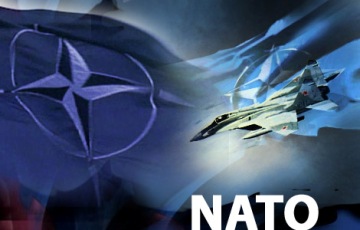Parlez-vous OTAN? NATO searches for a new boss
 Krakow, Poland - NATO defence ministers spent much of their time talking about anorak material like "headquarters reform" and "transformation", NATO-speak for bigger and better guns, at a snow- bedecked meeting in Krakow this week.
Krakow, Poland - NATO defence ministers spent much of their time talking about anorak material like "headquarters reform" and "transformation", NATO-speak for bigger and better guns, at a snow- bedecked meeting in Krakow this week.
So you know something far more newsworthy is brewing when tabloid journalists also turn up.
The issue on everyone's mind? The next NATO chief.
The mandate of the current secretary general, Jaap de Hoop Scheffer, a smooth former foreign minister from Amsterdam, expires in July.
But diplomats are already engaged in lively behind-the-scenes negotiations, with officials hoping that a new boss might be selected in time for the alliance's 60th anniversary summit of April 3-4.
Technically, there are no official candidates for a post that comes with no real power and which frequently involves paying lip service to the United States.
"The post of NATO secretary general has a strong symbolic significance and there are limits to what he can do. The ideal candidate needs to be a consummate diplomat and a power-broker," said Robin Shepherd, an analyst at the London-based think-tank Chatam House.
In practice, a slew of ministers, prime ministers and former presidents are drooling over the job.
Those whose names are most often linked with the job include the Danish prime minister, Anders Fogh Rasmussen, Poland's foreign minister, Radoslaw Sikorski, and Solomon Passy, a former foreign minister from Bulgaria.
The latter was spotted dining in Krakow a day before NATO defence ministers met. Rasmussen, meanwhile, spent much of the week on a charm offensive to London and Berlin, which he insisted was absolutely not about NATO.
"I am not a candidate to any international post, and it is my intent to stay on as prime minister of Denmark," Rasmussen said ahead of his departure from Copenhagen. The comment was generally interpreted by Danish reporters as further evidence that he was indeed a candidate.
Other names being considered include Aleksander Kwasniewski, a former Polish president, Desmond Browne, a former British defence secretary, and John Manley, a former deputy prime minister from Canada.
Asked whether it was true that he too was a runner, Danish Defence Minister Soren Gade said in Krakow: "Us defence ministers are just little pigs."
According to the alliance's official website, the "selection (process) is carried through informal diplomatic consultations among member countries, who put forward candidates for the post."
NATO diplomats have so far held two round of discussions on the issue, with the talks being lead by their doyen - a Dane.
Candidates are senior statesmen or stateswomen proposed by member states. The post normally lasts four years and a decision is taken by "consensus". As officials frequently point out, "there are no vetoes in NATO."
A command of the French language is also seen as a key requisite for an organization based in Brussels and which is soon expected to see the return of mighty France to its command structure.
One reason why former Prime Minister Tony Blair is touted as the next head of the European Union, for instance, is that he is one of the few British politicians to be fluent in the language of Voltaire.
Sikorski, meanwhile, has been going out of his way to dispel rumours that his French is not that good.
Shepherd said lack of fluency in French would not in fact pose an insurmountable obstacle to any candidate.
Much more important is an ability to maintain unity over NATO's biggest and most difficult mission - Afghanistan.
"Afghanistan will occupy 80 per cent of the next secretary general's time," said Shepherd.
Sikorski would be "a fantastic choice", Shepherd said, though it risks sending the "wrong signals" to an increasingly belligerent Russia - not least because of controversial US plans to host a missile shield on Polish territory.
Many politicians from NATO's newest members from Eastern Europe are positively craving the job.
Bulgaria has enjoyed traditionally strong ties with Russia, meaning Passy should also be viewed as a strong candidate.
According to US Defence Secretary Robert Gates, who was also present in Krakow, the ideal candidate should enjoy "the broadest possible support across the alliance" and have "the executive experience to run a very large and complex organization."
Gates said he had "a lot of respect" for Denmark's prime minister and defence minister, but stressed that "there are a lot of capable people."
In the end, "Rasmussen would be a good compromise," Shepherd said.
Asked by a reporter from the Danish tabloid Ekstra Bladet whether Rasmussen would have the right qualifications for the job, the current NATO chief, de Hoop Scheffer said: "Nice try. But I am still in my job and I am enjoying it." (dpa)